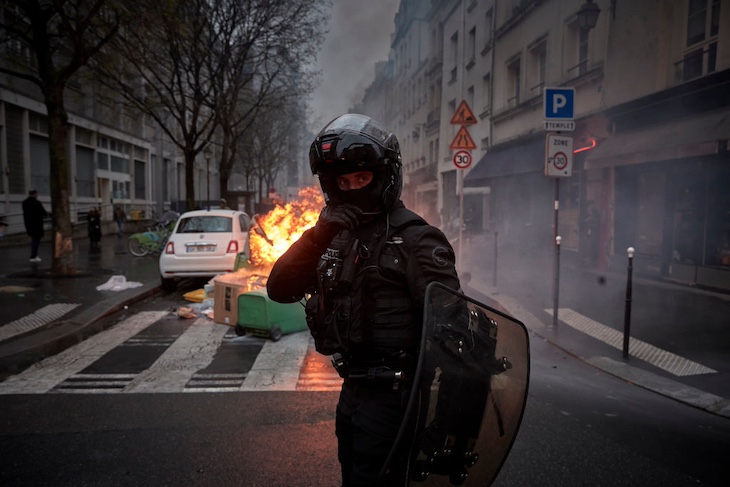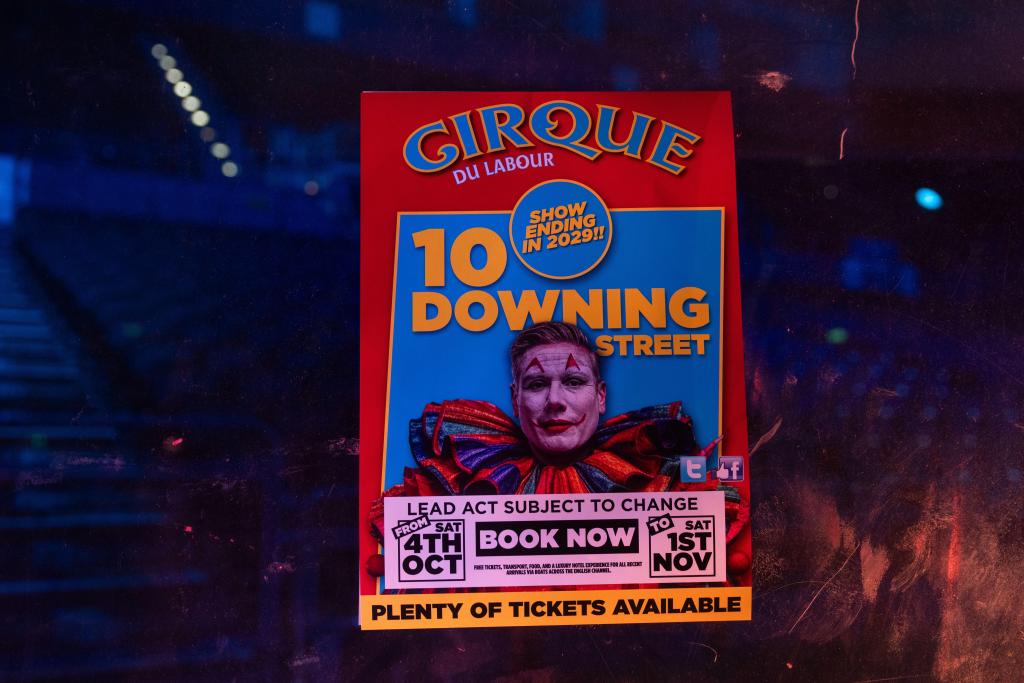The phrase ‘without fear or favour’ has been much in the news of late. Whether the maxim is still applicable to the British constabulary is a matter of conjecture. Some, like the ex-policeman Harry Miller, have been saying for years that the police ‘have traded impartiality for the praise of special interest groups’. Miller was visited by Humberside police in January 2020 after he expressed gender-critical views in an online poem. He later won a legal challenge against the police.
There is a refreshing no-nonsense approach to French policing
Others insist that the police remain impartial. Interviewed during the recent anti-immigration riots in England, Home Secretary Yvette Cooper rejected the idea of ‘two-tier policing’, saying they operate ‘without fear or favour, whatever the kinds of crimes it is that they face.’
Harry Miller might challenge that view, as might the teacher from Batley Grammar school. He remains in hiding more than three years after an Islamist mob gathered outside his place of work after he showed a caricature of the Prophet during a discussion about free speech.
When Dame Sara Khan published her report into the incident earlier this year, she was highly critical of the police, saying there ‘was a lack of public robust messaging that made clear that any threatening, harassing or intimidatory behaviour against the RS teacher and other teaching staff would not be tolerated.’
A month after Miller was told by the police to check his thinking, I wrote a piece for Coffee House entitled ‘British police must learn from France in dealing with Extinction Rebellion’. Like many other Britons, I had watched the television in disbelief as police in Cambridgeshire stood idly by while climate change yobs dug up Trinity College’s ancient lawn.
On the subject of Trinity College, has anyone been arrested in connection with the criminal damage inflicted on the portrait of Arthur Balfour earlier this year? A woman from Palestine Action was filmed slashing the portrait at Trinity. Police said they were ‘investigating’ the crime but the case has gone cold, at least in the media.
Back in 2020 I described the British police as ‘the paramilitary wing of the Guardian’. Nothing has happened since then to change my mind. Meanwhile my admiration for the French forces of law and order continues to grow.
These are men and women who carry out their duties without fear or favour. There is a reason why the British tradition of glueing yourself to a busy road never took off in France; some environmental activists tried it, but found that they didn’t much like being pepper-sprayed by the impatient police or having their glued hands ripped from the road.
There is a refreshing no-nonsense approach to French policing. In June I attended a large left-wing rally in Paris, a protest against Emmanuel Macron and Marine Le Pen’s National Rally. The police were out in force, scrutinising protestors as they emerged from the metro at République. I came up the stairs behind a group of young men dressed in black hoodies. One wore a small rucksack. A giant gendarme asked the man to open his rucksack. The man ignored the request, so the gendarme simply ripped the rucksack from the man’s back. There was a squeal of protest. ‘If I tell you to do something, you do it,’ explained the gendarme.
Some on the French left, notably Jean-Luc Melenchon’s La France Insoumise, accuse the police and the gendarmerie of brutality and racism. Melenchon says they have a ‘shoot to kill’ policy. The police reject the accusations and point to the increasingly violent society that is modern France.
In 2023 more than 15,000 officers were injured in the line of duty and nine lost their lives. A minority on the left mock the dead. ‘One dead cop = one vote fewer for the NR [Marine Le Pen’s National Rally]’ is a taunt seen sometimes on placards at left-wing demos. Asked about it in June, Melenchon brushed the jibe aside, saying ‘we have the right to laugh, don’t we?’
It is estimated that between 50 and 60 per cent of the police and gendarmerie vote for Le Pen or Eric Zemmour. Their political views don’t appear to influence their conduct. When a far-right mob arrived in the southern town of Romans-sur-Isère last November in search of a fight, the police were quickly on the scene to disperse them.
A few weeks later police and gendarmes in riot gear confronted a large convoy of tractors on their way to Paris to protest about the crisis in the farming industry. One police union admitted that they sympathised with the plight of the farmers but that would not affect how they dealt with anyone ‘who got out of hand’.
Some did go too far in their protest, breaking into a storage area at Rungis market south of Paris. Police arrested 79 protesters, some of whom belonged to the right-wing farmers’ union, Coordination rurale. Their spokeswoman accused the police of overreacting.
The police didn’t overreact, they were doing their job, without fear or favour.








Comments